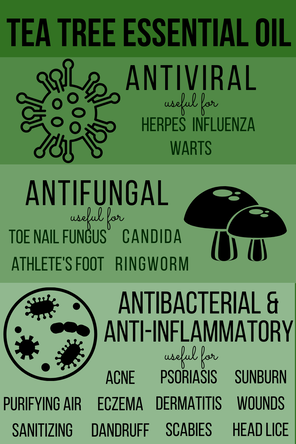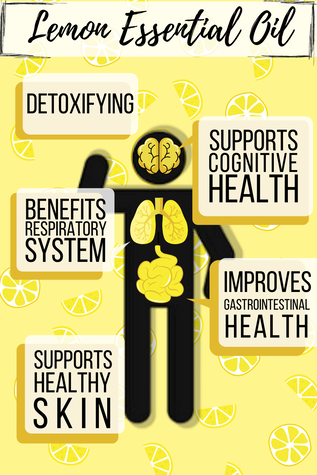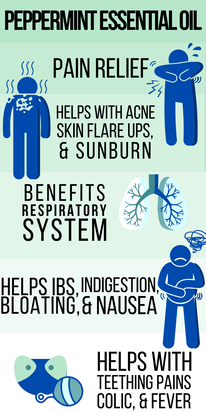|
Tea tree essential oil is highly beneficial to keep in your oil arsenal. Its antiviral, antifungal, antibacterial, and anti-inflammatory properties make it a staple oil to have on hand. It is extremely beneficial to our skin, in wound care, and in our overall health. It makes a great addition to skincare products, cleaning sprays, and diffuser blends, as it kills many pollutants on our skin and in the air. Effective Antibacterial Agent Because tea tree has such powerful antibacterial and anti-inflammatory properties, it can be helpful in treating eczema, itchy skin, psoriasis, and contact dermatitis. It is beneficial to the scalp as well, improving conditions like dandruff and dermatitis. It can also do wonders for our complexion, as it helps to alleviate acne and regulate oily skin, according to this study which found that when a sunscreen containing tea tree was used for 30 days, participants’ oily skin improved! Tea tree has also proven to help helpful when caring for wounds, whether it be from a sunburn, bug bite, or a bad scrape or cut. It has shown to reduce the amount of time needed for a wound to heal, and it has shown to have antiseptic properties that help to keep wounds clean during the healing process. It has even shown to kill MRSA in lab settings, but more research is still needed to prove its efficacy. Tea tree can also be used as a natural deodorant and bug repellant! When we sweat, secretions from our sweat glands combine with the bacteria already present on our skin. Since tea tree is such a powerful antibacterial agent, it kills the bacteria, resulting in less body odor. It has also been shown to repel flies and mosquitoes. One study even found that it was more effective in repelling mosquitoes than DEET was! Others found it to be effective in treating scabies and killing head lice and eggs. Since it is such an effective antibacterial agent, tea tree makes a wonderful addition to cleaning sprays and diffuser recipes as well! Just adding a few drops will help to kill bacteria on spray surfaces as well as purify the air. Fights Viral Infections Using tea tree essential oil to combat viral illnesses can be effective! If you suffer from recurring cold sores, you may have success in adding tea tree to your skincare products. This study shows that tea tree can have a direct antiviral effect on the herpes virus, but only before or during the process of the virus penetrating a cell’s membrane. Meaning, that when used as a preventative, you can easily have success in preventing an outbreak. Research has also been conducted on how the oil interacts with the influenza virus. Interestingly enough, in a lab setting, it does have the ability to prevent the virus from entering a host cell. A virus usually acts by attaching itself to a healthy cell and then flooding it with its viral DNA. When tea tree was involved, the virus kept its structural integrity, but the oil kept the virus from flooding the healthy cell with its viral DNA. It did this by binding to a cell receptor responsible for “opening” the cell’s membrane, so that the virus couldn’t bind to it itself. It was also suggested in a separate study, that tea tree was highly effective at inhibiting virus replication if it was implemented early on in the exposure (in vitro studies suggest within the first two hours after infection). Since it displays such powerful antiviral properties, successes have also been found when diluting the oil and applying it a few times daily to warts. Potential Treatment for Fungal Infections Tea tree essential oil has strong antifungal properties. Because of this, more and more trials are being conducted to prove its efficacy in treating fungal infections like candida, athlete’s foot, toenail fungus, and ringworm. One in vitro study found that tea tree oil was effective in killing candida in patients that used dentures while also alleviating the sores that may arise from candida. The study theorized that tea tree oil could potentially be used as a coating on dentures to reduce the effects of this fungal infection, but in vivo studies are still needed. Another study tested the effects of using tea tree oil to treat vaginal candida. Vaginal suppositories containing tea tree showed fungicidal activity against all strains of candida, but it is important to note that in vivo studies are still needed to determine the efficacy of using tea tree oil to treat vaginal candida. So, whether you are using tea tree in your diffuser blends or cleaning up a nasty scrape, it is one of the best oils you can have on hand. Sources: https://www.ncbi.nlm.nih.gov/pmc/articles/PMC5960548/ https://onlinelibrary.wiley.com/doi/abs/10.1002/ptr.5422 https://www.ncbi.nlm.nih.gov/pmc/articles/PMC6270578/ https://pubmed.ncbi.nlm.nih.gov/21095205/ https://www.ncbi.nlm.nih.gov/pmc/articles/PMC5988111/ https://www.ncbi.nlm.nih.gov/pmc/articles/PMC3480584/ https://clinmedjournals.org/articles/ijdrt/journal-of-dermatology-research-and-therapy-ijdrt-2-032.php?jid=ijdrt https://pubmed.ncbi.nlm.nih.gov/12121393/ https://pubmed.ncbi.nlm.nih.gov/11338678/ https://pubmed.ncbi.nlm.nih.gov/26412058/ https://www.ncbi.nlm.nih.gov/pmc/articles/PMC5913821/
1 Comment
 Sweet, sweet summertime. Oh, how I adore you! One of our favorite oils to use this time of year is lemon. It has such a happy, revitalizing scent, which makes it a staple in our diffusers on these warm days! Lemon essential oil has a hefty list of uses and benefits since it is antiviral, antibacterial, antifungal, antimicrobial, and anti-inflammatory. So, now you see why it is a fan-favorite and very handy to have around! This truly is a full-body-benefiting oil. It can affect everything from your mood to your fat cells and organs. Not to mention all of the benefits it provides when you use it in cleaning sprays and skin products. Let’s get a little more specific... Supports Cognitive Health Lemon can have a huge impact on your mood! It boosts creativity and regulates serotonin and dopamine activity, according to mice studies, and, according to a student study, it enhances attention levels, concentration, cognitive performance, mood, and memory during learning processes. Because of its antioxidant properties, it also provides protection for neurons by scavenging free radicals. Benefits Respiratory System Lemon is one of the best oils that you can use to treat allergy symptoms. It is anti-inflammatory and will help to kill airborne bacteria and potential allergens when diffused. It can lessen the immune response to allergens in the first place, making symptoms less severe. When inhaled or applied topically, it helps to encourage lymphatic drainage which can aid coughs, congestion, and mucus secretion. Improves Gastrointestinal Health Lemon can help with your digestive health by relieving bloating and constipation, as well as gastritis symptoms. Lemon can reduce the erosion that occurs in the lining of your stomach from stomach acid, therefore offering some relief from indigestion and nausea. If you suffer from morning sickness, inhaling lemon essential oil could benefit you as well! It has shown to decrease nausea symptoms by 33%! It can also aid with weight loss because it can cause an increase in the breakdown of fat cells when ingested or applied topically. Supports Healthy Skin It is important to note that lemon essential oil is photosensitive, and when applied topically, makes your skin sensitive toward sunlight as well! To be safe, wait about 12 hours before exposing your skin to sunlight if you have topically applied any lemon essential oil. Lemon essential oil is very nourishing to the skin. It targets free radicals which are harmful to skin cells and can accelerate aging. It makes topical skincare with infused vitamins more effective by enhancing the release of vitamins E, A, B6, and C. It also can be applied topically as an insect repellent to keep mosquitoes and ants away. Detoxifying As mentioned earlier, lemon essential oil encourages the drainage of the lymphatic system. This is highly beneficial as the lymphatic system is responsible for helping to remove waste and toxins from the body. In rat studies, the oil has shown to reduce oxidative stress and damage in the liver and kidneys. Anticancer Properties While more research is still needed, there have been some interesting studies conducted about the efficacy of lemon essential oil on human tumors. It has shown to diminish prostate, lung, and breast tumors. It has also been found to induce the natural cell death of Leukemia cells. So, whether you take advantage of its disinfecting properties by adding it to your cleaning products or diffuser, or you use it for its many health benefits, lemon is a perfect oil to keep as part of your basic oil tool chest. It is a simple and safe oil to use (when being mindful of its photosensitivity) and can be perfect to implement in your daily life. What are your favorite ways to use lemon essential oil? Let us know in the comments below! Sources: https://pubmed.ncbi.nlm.nih.gov/24829772/ https://pubmed.ncbi.nlm.nih.gov/19410566/ https://www.ncbi.nlm.nih.gov/pmc/articles/PMC6073409/ https://pubmed.ncbi.nlm.nih.gov/14758720/ https://www.jstor.org/stable/30077505?seq=1 https://pubmed.ncbi.nlm.nih.gov/27098160/ https://www.ncbi.nlm.nih.gov/pmc/articles/PMC5435909/ https://pubmed.ncbi.nlm.nih.gov/27571876/ https://www.ncbi.nlm.nih.gov/pmc/articles/PMC6263286/  When it is 97 degrees outside, and it is hard to escape the summer heat, we feel pretty inspired to write about the wonderful, refreshing, and cooling properties that make peppermint essential oil so appealing. Second only to lavender essential oil, peppermint is considered the most versatile and widely used essential oil that you can get! From pain relief to natural cleaners, peppermint can be used for a wide variety of things. Peppermint essential oil is primarily made up of menthol (a whopping 50-60 percent on average, as a matter of fact!), which is why it produces an immediate cooling effect when applied topically. It is primarily sourced in the Yakima Valley of Washington State, and it’s refreshing, grassy aroma makes it a favorite of oil users. Peppermint Essential Oil is antimicrobial, antibacterial, and antifungal, making it a wonderful addition to skincare oils and creams, natural cleaning recipes, diffuser blends, and so much more! Pain Relief Peppermint essential oil can be very effective in decreasing inflammation, making it a great way to relieve pain naturally. It relaxes muscle aches and pains when applied topically or added to an epsom salt soak. It can also help to alleviate joint pain, and has been effective in relieving symptoms of rheumatoid arthritis. If you suffer from migraines, peppermint may benefit you! In a study comparing the use of lidocaine and peppermint essential oil as treatments for migraines, peppermint oil “caused considerable reduction in the intensity and frequency of headache and relieved the majority of patients' pain similar to lidocaine.” Since this oil is effective at relaxing muscles, it can also work wonders for those who suffer from tension headaches. Just massage a few drops on the back of your neck and to your temples to feel relief. Peppermint also acts as an a decongestant, making it effective at alleviating sinus headaches. Dilute peppermint and massage your sinuses to get some relief. Respiratory Benefits While we are on the topic of using peppermint to alleviate sinus problems, we can also talk about how effective this oil is during bouts of respiratory illness or irritation (hello, allergy season!). As mentioned before, peppermint essential oil acts as a decongestant and can help to open airways. When you feel a stuffy nose coming on, diffusing this oil or even making a chest balm with peppermint and eucalyptus can be helpful. A facial massage using peppermint can also help to drain excess mucus and relieve some of that pressure. Digestive Issues Peppermint does wonders for our gut. From IBS to occasional indigestion, this oil can help! In a double blind study of 57 patients with IBS, 75% of those who were given peppermint reported decreased symptoms. Just massaging a few drops mixed in a carrier oil around your belly can help if you have any bloating or indigestion at all. It has also proven to be effective if you suffer from nausea, whether it is from indigestion, morning sickness, or motion sickness. Inhale the oil or apply it topically to your stomach to get some relief. As an added bonus, peppermint can help to diminish food cravings, which can possibly solve even more of those indigestion issues depending on what you are craving! Skin Benefits Since peppermint is antimicrobial, antibacterial, and antifungal, it is amazing for our skin. It can help with acne by cooling irritated skin, and killing blemish-causing bacteria, it cools sunburns and takes away the stinging sensation, and it helps to fight dandruff and skin flare ups like eczema and skin rashes. It is also especially helpful this time of year because it repels spiders, ants, and mosquitos. If you do still get a bug bite, it helps to cool the bite area, reduces itching, and accelerates healing time! Infant Care It is important to note that when using essential oils with infants or children, you need to dilute them! Both infants and children have more sensitive skin, making them prone to reactions, and they require far less of an oil to achieve the same effects. If your sweet babe suffers from colic, diluting peppermint and massaging their tummy in a gentle, clockwise motion can offer some relief if the fussiness is being caused by excess gas or indigestion. It can also help if they are teething by relieving some of the pain. Dilute your peppermint and rub it along their jawline. Add clove or copaiba essential oil to make it even more effective! Peppermint can also be used on its own or with lavender as a fever reducer. Either dilute it and apply along the forehead and spine, or add drops to your hands, rub them together, and then use a cool, damp rag to wipe it up and brush the mixture across the forehead. Energizing & Enhancing Peppermint oil has shown time and time again to energize the mind and body and enhance mental clarity and focus when diffused or inhaled. In this study, it even showed to enhance physical exercise performance, grip strength, and it made the lungs work more efficiently! Peppermint truly is one of the most versatile oils you can buy. It is safe for all ages (when diluted) and is wonderful to have on hand. What are your favorite ways to use peppermint essential oil? Let us know in the comments below! Any information given through this platform is for educational purposes only. It is not intended to be used as a substitute for medical care or medical advice. Please do not use this information to diagnose, treat, cure, or prevent any disease. You should always speak with your healthcare provider before taking any medication or nutritional, herbal, or homeopathic supplement. Sources: Peppermint Oil (Mintoil) in the Treatment of Irritable Bowel Syndrome: A Prospective Double Blind Placebo-Controlled Randomized Trial https://pubmed.ncbi.nlm.nih.gov/31404204/ Instant effects of peppermint essential oil on the physiological parameters and exercise performance Ah…
It is that wonderful time of year again where all of the insects suddenly appear, and our glorious summer evenings have turned into a constant battle between enjoying the cool night air and not getting eaten alive. During this time, it is easy to pick up the cheapest bug repellants and spray away, thinking we are doing all we can to avoid the nasty bug bites that come with the changing of seasons. Unfortunately, we are opening up doors for toxic ingredients to be inhaled and absorbed into our bloodstream. While some ingredients are safe to use in moderation, others should be avoided completely. Concerning Chemicals:
So let’s dig in... DEET The most well-known bug spray ingredient and registered pesticide is DEET. It is one of the most effective, yet controversial ingredients found in a fair amount of bug repellents. It effectively repels many bugs and ticks, therefore reducing illnesses such as the Zika virus and Lyme disease. According to the EWG, when used as directed, DEET is considered safe by many public health organizations such as the CDC, AAP, WHO, and the EPA. Even with all of the information about the known toxicity of DEET, the EPA still concludes that normal use of the chemical is safe for the general population. It should be noted that it is known to irritate the eyes, and can, in very large doses, cause many issues such as neurological damage, skin blisters, seizures, memory loss, headaches, stiffness in the joints, and shortness of breath. The EWG also states concerns with children because they inevitably receive more DEET due to a greater surface area to body weight ratio. DEET is quickly absorbed through the skin, and when combined with sunscreens containing the chemical oxybenzone, it is absorbed even faster. It also has the ability to cross the placenta, and in animal studies, it remained in offspring up to three months old after maternal exposure. An important note to make with DEET is that while there are products out there that have up to 100 percent DEET, increasing the concentration does not increase efficacy! Because of all of the known effects of DEET, it is also recommended to wear long sleeves and pants, and spray your clothing rather than your skin. The Canadian government recommends limiting DEET to 30 percent in products that you use, and using an even smaller concentration for children. Their recommendations go as follows: “The right concentration of DEET for:
For infants younger than 6 months old, do not use an insect repellent containing DEET. Instead, use a mosquito net when babies are outdoors in a crib or stroller. Pyrethroids Pyrethroids are a common name for a group of bug repellent chemicals. This group contains over 1,000 insecticides including:
Permethrin Permethrin is a synthetic version of pyrethrum. It is labeled as non-toxic by the EPA, but still poses risks. It can be inhaled, ingested, or absorbed through our skin, and it can cause eye, skin, nose, and throat irritation as well as breathing problems. It is a suspected carcinogen, hormone disruptor, neurotoxicant, and reproductive toxicant. One study conducted at Duke University showed that when exposed to both DEET and permethrin, side effects such as motor deficits and memory dysfunction can occur. Cyfluthrin Cyfluthrin is a synthetic insecticide that closely resembles DDT and is moderately toxic when inhaled. Breathing in this chemical can cause headaches, nausea, and vomiting. It accumulates in fatty tissues and, therefore, affects the central nervous system. It is highly toxic when consumed (which is why it is so important to assess what we put on our children as they are more likely to put their hands in their mouth). Because cyfluthrin affects the central nervous system so much, it has been known to cause jerky movements, incoordination, muscle trembles, and convulsions. In a study conducted with rats, it caused nerve degeneration and it broke down muscle tissue. To make matters worse, being exposed to any kind of pyrethroid increases the risk of skin paresthesia. This tingling or burning sensation on the skin’s surface is made worse by heat, sun, or perspiration. This is cause for concern of course since bug sprays are used in the summertime, when you spend more time in the sun, are prone to getting hot, and sweat more. So how can we safely repel insects? There are many ways to naturally prevent bug bites. The most notable include:
Many essential oils deter insects, however the most notable is Lemon Eucalyptus. It is effective in that it contains para-menthane-3,8-diol (PMD) which makes it more difficult for insects to detect your scent. It should be noted that lemon eucalyptus should NOT be used by children under the age of 3 as it poses a risk of skin irritation. You can safely make your own essential oil blend by using a combination of any of these oils diluted with a carrier oil:
IR3535 IR3535 is a synthetic ingredient that has been used for about 30 years in Europe as a safe bug repellent ingredient. It can be very irritating to the eyes, but works well and is safe to use. It works similarly to lemon eucalyptus in that it messes with an insect's sense of smell. It is just about as effective as DEET at repelling mosquitos, and is an excellent choice to repel ticks, offering twice the protection time as DEET. It has been recommended for use by pregnant women and young children (although it is still recommended to avoid putting on children’s hands, as its toxicity is unknown when ingested). Any information given through this platform is for educational purposes only. It is not intended to be used as a substitute for medical care or medical advice. Please do not use this information to diagnose, treat, cure, or prevent any disease. You should always speak with your healthcare provider before taking any medication or nutritional, herbal, or homeopathic supplement. Sources: MADE SAFE Chemicals of Concern in Bug Repellent ATSDR - Toxicological Profile: DEET (N,N-diethyl-meta-toluamide)a http://www.npic.orst.edu/factsheets/cyfluthringen.html#:~:text=Cyfluthrin%20is%20moderately%20toxic%20if%20inhaled.&text=Breathing%20in%20cyfluthrin%20may%20cause%20headaches%2C%20nausea%2C%20and%20vomiting.&text=Inhaling%20pyrethroids%20may%20worsen%20symptoms%20of%20asthma.&text=Rats%20that%20inhaled%20very%20low,hair%2C%20and%20were%20less%20active. Insect repellents - Canada.ca Poisoning Due to Pyrethroids - PubMed IR3535 Repellent FAQ | Safety, Effectiveness, Side Effects Repellent Chemicals | EWG's 2018 Guide to Bug Repellents Rosemary essential oil is a perfect oil to have on hand, whether you are an essential oil connoisseur, or if you are just beginning to experiment with essential oils. It has many potential benefits, and its woodsy, grounding aroma is a perfect addition for many diffuser blends. It is easily used both topically and aromatically and can aid in a variety of ailments ranging from circulation issues to memory function.
The oil comes from the small shrub that originated in the Mediterranean. The ancient Egyptians used the oil as a symbol of remembrance and often included it in the coffins of loved ones. In ancient Greece, rosemary was burned as an offering to the gods as it was seen as a sacred herb. They also used the herb to encourage recollection and clear thinking. Aura Cacia prides themselves with the purity and quality of their essential oils. Their rosemary essential oil is typically wild-harvested in the Atlas Mountains of Morocco. Each section can be harvested only once every three years, and the oil is sustainably distilled in the spring. Best Uses: Improves Memory and Brain Function Research shows that by using rosemary aromatically, the breakdown of acetylcholine can be prevented. Acetylcholine is the neurotransmitter important for amplifying or inhibiting signals exchanged by nerve cells, and is vital for thinking, concentration, and memory. In one study, twenty individuals were asked math questions while inhaling rosemary essential oil. Their recollection increased proportionally to the duration the oil was diffused. In a similar study, nursing students were able to remember more information while testing compared to those who breathed lavender or no oil at all. In a study using school-aged children, it was determined that rosemary had a positive effect on short-term memory. Another pointed to the idea that higher concentrations of rosemary resulted in increased speed and accuracy of recollection compared to control groups. So much research suggests that rosemary is wonderful for our brain health and cognition, so wouldn’t it make sense to study how it affects those with Alzheimer’s Disease? The results of a rat study suggested that rosemary can be a consideration for the treatment and prevention of dementia. It showed that rosemary led to improved long-term memory. Another rat study showed that rosemary had antioxidant effects that protected neurons, helped to inhibit the buildup of metal ions in the brain, and lowered inflammation in the brain. Support your cognitive health by adding a few drops of rosemary to your diffuser or salt candle and taking deep, relaxing breaths. May Stimulate Hair Growth and Prevent Abnormal Hair Loss This essential oil can be used to potentially strengthen hair follicles by encouraging circulation in the scalp. By encouraging blood supply to your hair follicles, you can prevent your hair follicles from dying off. It also contributes to overall scalp health, alleviating dandruff and itchy scalp. In Androgenetic Alopecia (AGA) patients, rosemary essential oil, when compared to minoxidil, had the same results as far as hair count at the end of the trial. Rosemary patients, however, reported less scalp itching. Rosemary may be a great natural hair treatment option that could be more tolerable than traditional treatments. Encourage a healthy scalp by adding a few drops of rosemary to your shampoo, or making a light scalp oil with rosemary and jojoba. Pain Relief When applied topically, rosemary essential oil can be a great pain reliever! In one study, patients who had suffered from a stroke were treated with acupressure. Half of the participants received aromatherapy as well as acupressure. The patients receiving aromatherapy alongside acupressure reported fewer or less intense pain symptoms. In an animal study, the oil was slightly more effective than acetaminophen for reducing pain symptoms. Applying rosemary essential oil topically can also help to lower inflammation in injuries as well as the symptoms of rheumatoid arthritis. It is hypothesized that rosemary helps to encourage white blood cells to move to injured tissues to release inflammatory chemicals. Add a few drops of rosemary to your favorite lotion or carrier oil and massage on areas of concern. Bug Repellant Rosemary can help repel mosquitos. When it was compared to eleven other essential oils, it repelled mosquitos the longest. It is also effective in controlling the spread of ticks. Stress Reduction Inhaling rosemary may reduce levels of cortisol. Having increased cortisol levels can suppress the immune system, cause insomnia, and contribute to mood swings. Rub a drop of rosemary between your palms and cup them around your nose and mouth while taking deep breaths to experience stress reduction. Aids in Digestion By diluting rosemary oil and applying topically on your belly, you can alleviate symptoms of indigestion such as gas, bloating, nausea, and constipation. It reduces gas pains, promotes healthy gut flora, reduces inflammation, and prevents weight gain. Anticancer There are some promising studies coming out about the effects of rosemary on cancer cells! While more in vivo studies still need to be conducted to prove its efficacy, plenty of studies have been conducted in lab settings to show its effects on tumors. It decreased colony formation, thus inhibiting cell growth, in colon cancer cells. It also decreased the viability of cancerous cells of certain pancreatic, breast, prostate, bladder, ovarian, cervical, liver, and lung cancers, as well as leukemia. It also encouraged natural cell death in these cancer cells as well. It is important to note that there is a wide range of concentrations of rosemary used in these studies, so more research needs to be done to find effective does in vivo. But these studies are promising for the future of targeted cancer treatments! In rat studies that have been conducted, rosemary:
Rosemary essential oil makes a wonderful addition to your oil collection. Its grounding, earthy scent is a favorite of many, and more and more research is surfacing about its many health benefits. How do you use rosemary essential oil? Let us know your favorites down in the comments below! Any information given through this platform is for educational purposes only. It is not intended to be used as a substitute for medical care or medical advice. Please do not use this information to diagnose, treat, cure, or prevent any disease. You should always speak with your healthcare provider before taking any medication or nutritional, herbal, or homeopathic supplement. Sources: https://pubmed.ncbi.nlm.nih.gov/23983963/ https://pubmed.ncbi.nlm.nih.gov/17011181/ https://pubmed.ncbi.nlm.nih.gov/17583499/ https://pubmed.ncbi.nlm.nih.gov/20695287/ https://pubmed.ncbi.nlm.nih.gov/21663474/ https://pubmed.ncbi.nlm.nih.gov/23557932/ https://www.ncbi.nlm.nih.gov/pmc/articles/PMC5133115/ https://pubmed.ncbi.nlm.nih.gov/21382660/ https://europepmc.org/article/med/25842469 https://www.ncbi.nlm.nih.gov/pmc/articles/PMC4749867/ https://www.sciencedirect.com/science/article/pii/S2314808X16301890 https://www.ncbi.nlm.nih.gov/pmc/articles/PMC3736918/ https://pubmed.ncbi.nlm.nih.gov/24080468/ https://pubmed.ncbi.nlm.nih.gov/17388768/ https://pubmed.ncbi.nlm.nih.gov/25635991/ |
About UsNature knows how to take care of you. And when your body is craving vitamins, supplements, and health support from earth-true resources, you can count on Natural Foods & Supplements of Kearney to have the products and tools you need. Our broad selections of supplements, essential oils, and effective probiotics make it easy to fill your body with goodness. And our holistic offerings like Zaza Boo cosmetics and Himalayan Salt lamps support your wellness from the outside in. Plus, our caring staff is always here to help you find exactly what you're looking for among our variety of offerings. Give your body the tools for wellness and healing, and let nature do the rest. Categories
All
Archives |





 RSS Feed
RSS Feed
